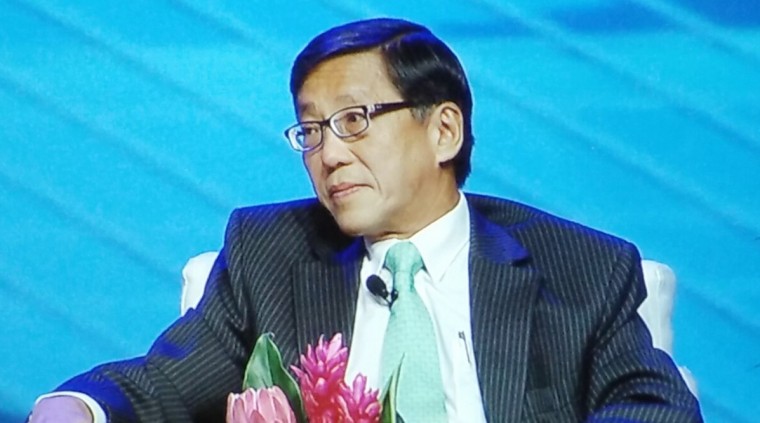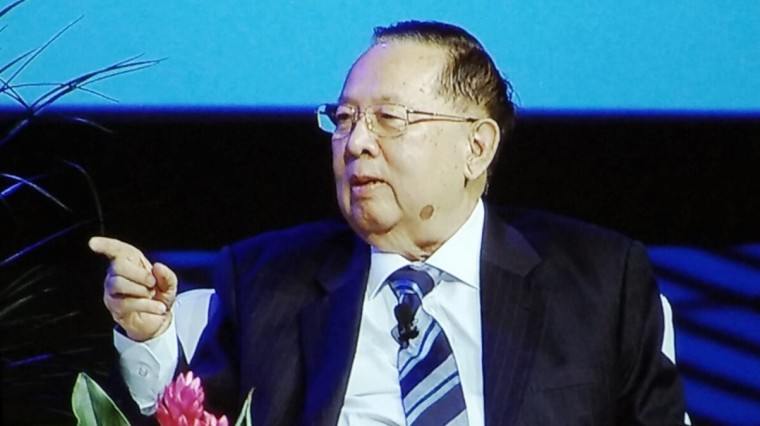Ho Kwon Ping (ex-journalist, founder of the Banyan Tree hotel group and all-around badass), Ngiam Tong Dow (retired high-powered civil servant, also quite a badass) and lesser-known, but also quite important panellist Beh Swan Gin (Singapore's Economic Development Board chairman) sat down together in the opening panel of the DBS Asia Insights Conference on July 10, 2015, with former Nominated Member of Parliament Tan Shu Shan.
The panellists were discussing the topic, "How Can Singapore Future-proof its Relevance for the Next 50 Years".
Here are 6 things they said about Singapore's future that are worth quoting:
From Ho Kwon Ping:
1. On survival:
I think survival is a foregone conclusion — although all of us know that in Singapore, we like to be paranoid — we always like to say only the paranoid survive.
2. On press freedom in Singapore:
As a former journalist I will probably say I'm a bit biased... obviously I think freedom of the press is important, not just to the economic future of Singapore, but to the well-being of any country.
That having been said, obviously, freedom of expression overall is a very big question. You've got Charlie Hebdo type of freedom, which is totally unrestrained freedom to go into any area regardless of its sensitivity. I think all of us in Singapore recognise already the necessity to have certain what has been called OB markers (out of bounds markers), certain areas which are sensitive, based on our own heritage and should be dealt with very carefully, and not just be freely expressed.
But the bigger question here, I think, is as we evolve as a society, as there is less cohesiveness also in greater diversity, where are these OB markers going to be? We've already seen with the case of Amos Yee and other young people that will probably be coming out over the next many years that a lot of young people are going to try to test the system, they’re going to try to push the boundaries — and these boundaries are not well-defined in Singapore.
So to me the bigger issue here is that over the next 50 years, if we are going to future-proof ourselves, we urgently need to empower and strengthen civil society... I think given the uncertainties ahead, it's absolutely important that civil society be strengthened. And there are aspects about civil society in Singapore today that’s not strong enough, because the only way you can maintain a cohesive society against political change, against socio-economic change, is to ensure the fabric of that society is kept intact by many different players at much more different levels rather than just the old paradigm of the governed and the governors. It is going to be a lot more self-government and participative democracy by itself… a much more collaborative and that's going to be the challenge for Singapore, not just freedom of the press.
3. On whether civil servants in Singapore are overpaid:
I think if you look at Singapore compared to our neighbours, I would clearly say that if we have to err, I would rather err on the side of overpaying our civil servants. You cannot always get it right 100 per cent of the time. But is it better to underpay or overpay? I would err on the side of overpaying. Because then you get the best talent. How do we get to be where we are today with our ranking in the world as one of the most incorruptible societies in the world? Because of the leadership set by Lee Kuan Yew before in terms of paying civil servants and politicians very high.
Now, we may have erred in the sense that perhaps the civil service is paid a little bit too high compared to this and that, and I think a lot of these tweakings will have to be considered as we go along the way. I would not be one to argue that the civil service is underpaid but again, it is better to tweak the system and to reform the system from where we are today than to be a situation where civil servants are all forced to essentially be corrupt because they're so underpaid. So I would rather that we are in this situation today than the other. Better over than under.
I think the danger of overpaying the civil service is not really one where there is a lot of red-eyes from elsewhere. The danger is that there's this huge sucking noise of the best talented people going to the civil service… and that does hurt the private sector, because either we have to keep up with salaries, which are quite high, or you have perhaps an overbalance and a hollowing out of the best and brightest in Singapore, all going to the public sector. And that may not be good for Singapore in the long run.
From Beh Swan Gin:
4. On meritocracy having to change:
I actually think that in Singapore we need to rethink the concept of meritocracy, because I think what we have today is one-dimensional, which is really: you get good grades, you progress, you go to university, you get a good white-collar job, and you’re set for success. But in reality there are multiple paths of success today, and certainly going forward. We are not going to be, life will not be so straightforward. We should tolerate failure and we should recognise talents in different ways and not just through academic grades.
And the reason why I’m bringing this up is in the way we are selecting civil service leaders, where in the past it has been very much emphasis on the intellect and analytical skills. Today that's not enough, and we are also looking for civil servant leaders who have different sorts of skills — the ability to connect with the ground, the ability to understand issues and the ability to rally the people around them. Going forward, this needs to shape how we conceive of meritocracy.
5. Making the case against allowing all our businesses to thrive
I think we have to come to terms with the fact that we are a resource-constrained country. We can’t be an economy for every business and every sector. I mean, think about the number of restaurants in Singapore. There’s just too many, we're over-served. And if we are able to be a lot more rational, where in areas that are internationally trade-able, I think these are the areas which we will continue to be exposed to competition, and the market will sort itself out as to what firms will succeed, what sectors will succeed.
My concern are businesses that address the domestic market. And for too long, they have been able to benefit from the inflow of low-skilled, cheap labour from the region. And while it has been win-win, many foreign workers have been able to benefit and have a good life for their families and households, we’re a small country, and we are resource-constrained, and that can’t be the formula for success for businesses that address the domestic economy.
From Ngiam Tong Dow:
6. On increasing productivity in Singapore:
The CEO should become the chief productivity officer. You must get out of the comfort zone of your corporate office, get down to the factory floor, to the office floor, and lead from the front. You should show your staff how to do things better. But if you just give orders down the line, the British way, nothing’s going to happen. If you don’t change this mindset, our productivity will just be zero. I don’t think I’m a rumour monger but this is what I see. The CEO must be the chief productivity officer, please.
If you're the chief surgeon in a surgical unit in the hospital, you must operate more often and on more complex cases than your junior surgeons, that’s the only way they will respect you, and not just pass it down the line.
What we've learned from all this: Some local businesses must be allowed to fail, our CEOs need to know what we're doing, civil servants are not overpaid, and we must strengthen our civil society — till the next time we hear from these guys again.
Oh, and only the paranoid survive.
Top photo by Medha Lim.
If you like what you read, follow us on Facebook and Twitter to get the latest updates.
If you like what you read, follow us on Facebook, Instagram, Twitter and Telegram to get the latest updates.



